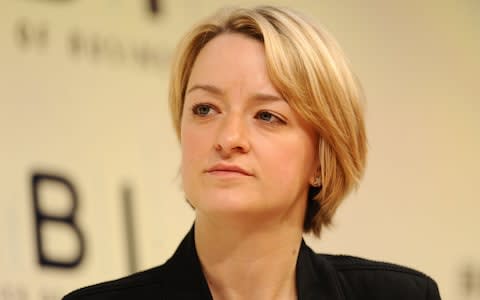BBC forced to defend use of its own journalists in Bodyguard after distressed viewers switched off

The graphic depictions of terrorist plots in the BBC drama Bodyguard left one mother of a Manchester terror attack survivor "unable to breathe", she said yesterday, as the broadcaster refused to answer questions over whether it had breached editorial guidelines in featuring its own journalists in the hit Sunday-night drama.
The BBC has been forced to defend itself as a number of viewers complained that they found the inclusion of high-profile BBC News presenters and reporters in coverage of fictional terrorist plots to be unsettling.
Laura Kuenssberg, Sophie Rayworth, Gordon Corera and Andrew Marr are four of 14 journalists from the corporation to star in the four episodes of Bodyguard aired so far.
"It blurs the lines. Having been through the situation myself, it does make me second guess what's going on in real life." said Lisa Fenton, 35, from Blackpool who was waiting outside the MEN arena to pick up her daughter and stepdaughter on the night of the Manchester terror attack at the venue.
She suggested the BBC should have used 'fictional reporters' instead, adding that her family relied heavily on the news in the wake of the attack: "The girls were on their phones in the back of the car as I drove home and we had the news on until 4.30am that night."

Seven million people tuned into Sunday night's episode of political thriller Bodyguard, which saw the unexpected death of Home Secretary Julia Montague, played by Keeley Hawkes alongside Richard Madden in his role as Montague's bodyguard and love interest DS David Budd.
Following the episode, viewers took to Twitter to highlight ethical concerns and the potential for reputation damage that could come from blurring the lines between fact and fiction.
"Really don't think it's wise to have @BBCNews presenters voicing what are fictional news accounts. Enjoying the show, but is a line crossed with this kind of content? Can you clarify editorial position, please?" wrote Lestyn T. Davies.
The inclusion of the BBC News studios and branding also appeared to be in violation of the corporation's own editorial guidelines.
The guidelines state: "It will normally be inappropriate to use a BBC correspondent in the field to front a fictitious news report. High-profile presenters should not be used in their usual news setting."
They add: "Current presenters of BBC news programmes should not appear as news presenters in a fictional bulletin if it is at all likely that his could cause confusion and concern."

Gavin Allen, the BBC's controller of daily news appeared on BBC News programme Newswatch to defend the inclusion of the broadcaster's own journalists in the drama.
"There are very clear visual and audio clues" throughout the series to show that the events being covered by recognisable BBC faces are "clearly fictitous", he said.
These clues included unfamiliar music being played through a broadcast of the Today programme and the camera angle from which an interview between Andrew Marr and Hawkes' character Montague is shot.
When asked whether the BBC had breached its own editorial guidelines, a corporation spokesperson refused to comment, stating only that: "It is very clear to the audience from the onset and throughout the series that Bodyguard is a work of fiction."
The BBC also did not say whether any official complaints had been received. BBC presenters do not receive extra pay for appearing in the show.

 Yahoo Movies
Yahoo Movies 
